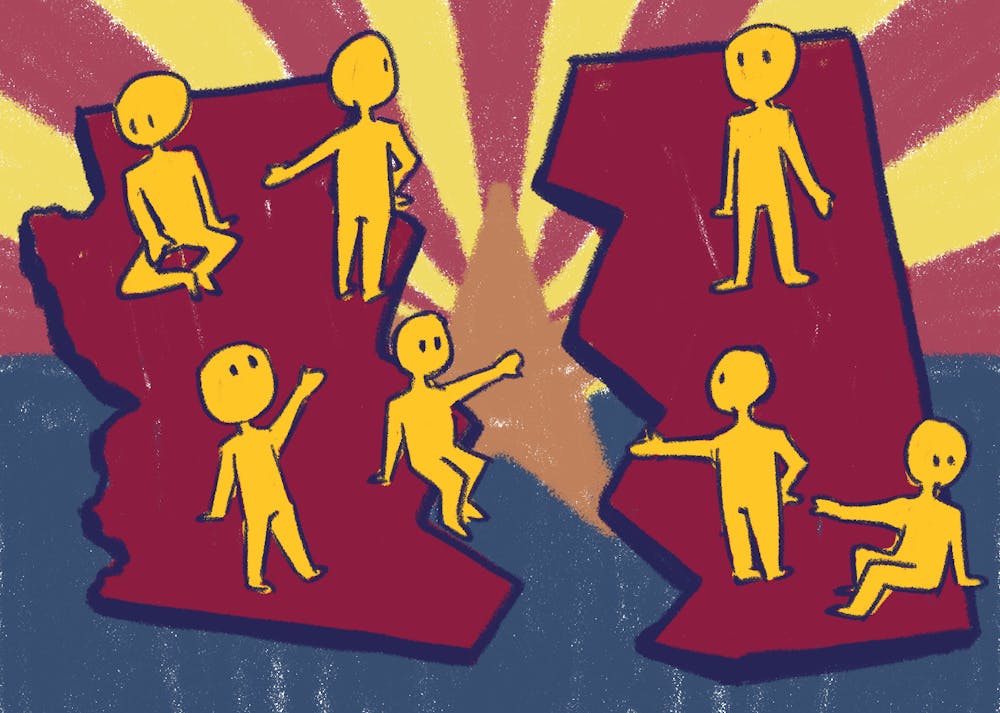The United Campus Workers of Arizona is a union representing faculty, staff and student workers at Arizona's universities, including ASU. According to its mission statement, the union has been working "to champion and defend the interests and well-being of all university workers, as well as to build and sustain social and economic justice in our workplaces and communities."
With a mission statement such as this, why doesn't the University recognize and support this union?
Currently, the Arizona Board of Regents recognizes university employees' right to organize and states that it "in no way affects their employment relationship."
However, the University and ABOR don't recognize these unions for the purposes of collective bargaining. This is due to state laws that prevent them from bargaining with public sector workers, such as campus workers at the University.
Because of this, UCWA is what's called a "wall-to-wall" union. Though a wall-to-wall union cannot engage in collective bargaining, that doesn't mean there are no tools available to it.
"A traditional or NLRB (National Labor Relations Board) union exerts a lot of its power through collective bargaining, a wall-to-wall union in a state like Arizona doesn't have recourse like that but can advocate in the public sphere and coordinate campaigns on campus together," said Alex Young, associate teaching professor, honors faculty fellow and vocal member of UCWA.
According to Young, the union functions as both a "space to communicate and coordinate when it comes to workplace issues" as well as a space to communicate "about political issues and be a force in the political world."
READ MORE: ASU's union struggles with getting recognition from administration
So while UCWA may not be able to collectively bargain, it can serve as a bullhorn for campus workers to voice collective concern regarding workplace issues.
But more importantly, according to Young, as UCWA grows in membership and in power, the union will continue to become a more present political force on campus, helping to vocalize campus workers' beliefs.
So why isn't the University listening to this bullhorn?
When it was first established in 2020, UCWA focused its advocacy on COVID-19 policy at the University. It published letters addressed to University administration protesting policies that asked for students and faculty to come back to campus in person. In addition, the union held a protest to convey this message. Unfortunately, these efforts were largely unacknowledged by the University, The State Press reported last year.
Currently, UCWA is pushing two petitions. One focuses on increasing wages and job security for contingent faculty , and the other focuses on a broad increase in the floor wages of all campus workers. Both are getting closer to their signature goals. Once they meet these goals, they will be sent to ASU President Michael Crow and ABOR.
READ MORE: ASU union workers demand $25 by 2025, stronger job security
According to Young, UCWA is focusing its efforts on growing its numbers and specific interventions. In the near future, it would be safe to say that it will have those numbers and be an even greater source of power in campus politics.
It shouldn’t take UCWA building up enough members for there to be consequences , such as a mass protest, at the University in order for ASU administration to listen to them. If the University wants to truly demonstrate that it cares for its community and its workers, it should be listening to them now.
To me, it's a win-win. Should the University start listening now, it proves it cares for its faculty, staff and student workers. When those petitions meet their goals, I hope the University will make the decision to finally acknowledge the union that represents the voice of its workers.
But above all, I hope the University will not only listen to its union but also begin to advocate for it as well. Right-to-work laws, such as the ones in Arizona that bar public sector employees from collective bargaining, are blatantly anti-worker.
I hope that the University will lobby to change these laws at the state level in order to allow its employees to better represent themselves and their interests.
Edited by Kate Duffy, Reagan Priest, Piper Hansen, Greta Forslund and Anusha Natarajan.
Reach the columnist at swmcgee@asu.edu and follow @swmcgeemedia on Twitter.
Editor's note: The opinions presented in this column are the author's and do not imply any endorsement from The State Press or its editors.
Want to join the conversation? Send an email to opiniondesk.statepress@gmail.com. Keep letters under 500 words and be sure to include your university affiliation. Anonymity will not be granted.
Like The State Press on Facebook and follow @statepress on Twitter.




